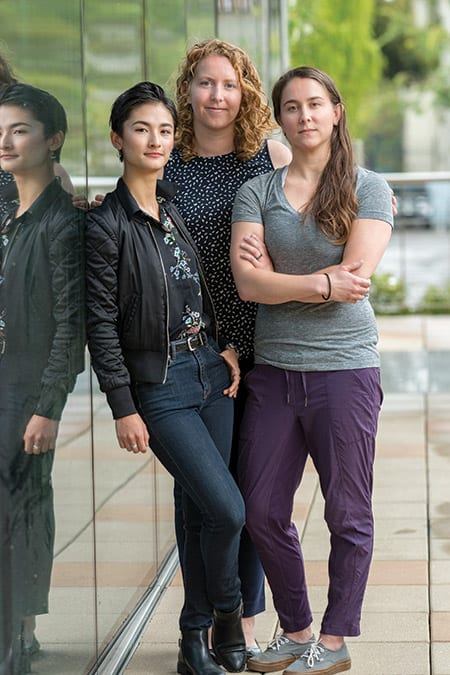
Lindsay DeRight Goldasich help lead Berkeley Law’s Native American Legal Assistance Project.
When the United States apportioned millions of acres to Native tribes more than a century ago in an effort to dissolve reservations, it left a thorny terrain with land rights regulation straddling tribal law and federal and state governments. For today’s Berkeley Law students, protecting indigenous land rights offers a way to untangle these issues, exercise legal skills, and help Native communities.
The Native American Legal Assistance Project (NALA) bloomed earlier this year during Berkeley Law’s Public Interest/Public Service Career Fair, when Lindsay DeRight Goldasich ’21 connected with Jay Petersen, senior staff attorney at California Indian Legal Services.
Now a Student-Initiated Legal Services Project led by Goldasich, Gia Jung ’21, Chelsea Mitchell ’21, Dallas Lopez ’21, and Zach Meeker ’21, the group grew in tandem with the school’s newly revived Native American Law Students Association.
Some NALA students worked previously with the Karuk-Berkeley Collaborative, a former student-led initiative that helped the Karuk Tribe of Northern California with natural resource management and intellectual-property issues.
“The Karuk-Berkeley Collaborative showed me what kind of tangible support law students can provide,” Mitchell says. “I love that through NALA we’ll be putting our resources where a tribe or client is asking us to put them.”
Other students bring deep-seated personal connections to this work. Jung notes the sacrifices of her great grandmother, who grew up on the Osage Nation Reservation in Oklahoma and started a small business in San Diego.
Through the encouragement of her grandmother, Jung’s mother was the first person in the family to go to college, and now Jung sees addressing inequality in the legal system as part of her responsibility.
“Without my grandmother’s hard work and dedication to her family, neither my mom nor I would’ve gotten to where we are,” Jung says. “I want to make Native legal rights and issues a big part of my pro bono legal career.”
NALA began its work this fall by focusing on land rights and expunging police arrest records. Both issues, while ostensibly about land and criminal justice, are at their core about providing an equal path to justice.
“We want to facilitate a better process between California and tribal courts, so that Native people can more easily access the system,” Jung says.
—Rekha Radhakrishnan